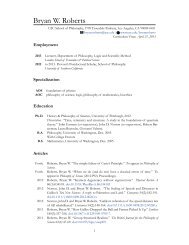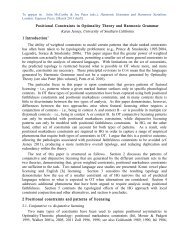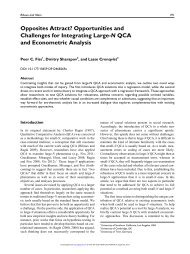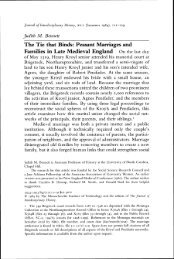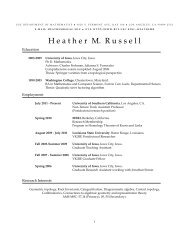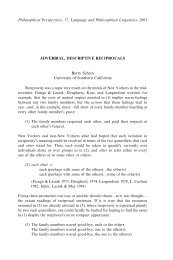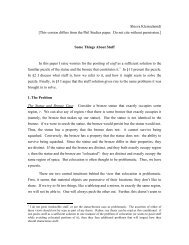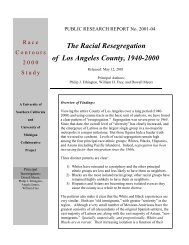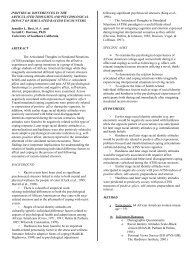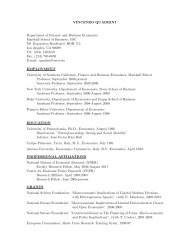The Diffusion of Ideas over Contested Terrain - Personal World Wide ...
The Diffusion of Ideas over Contested Terrain - Personal World Wide ...
The Diffusion of Ideas over Contested Terrain - Personal World Wide ...
Create successful ePaper yourself
Turn your PDF publications into a flip-book with our unique Google optimized e-Paper software.
5<br />
In the U.S., these g<strong>over</strong>nance practices<br />
are <strong>of</strong>ten supplemented by the separation<br />
<strong>of</strong> the CEO and board chair position as<br />
well as the presence <strong>of</strong> independent<br />
directors, both <strong>of</strong> which are usually considered<br />
important g<strong>over</strong>nance mechanisms<br />
to protect the interests <strong>of</strong> shareholders<br />
(e.g., Pozen, 1994). In Germany,<br />
neither <strong>of</strong> these measures is applicable<br />
because the position <strong>of</strong> CEO and chair <strong>of</strong><br />
the supervisory board are separated by<br />
law and other company <strong>of</strong>ficers are also<br />
prohibited from sitting on the supervisory<br />
board.<br />
#2144-ASQ V49 N4-December 2005—file: 49401-fiss<br />
shareholder value orientation. Examples <strong>of</strong> such statements<br />
are “.|.|. boosting shareholder value is at the centre <strong>of</strong> the<br />
Metallgesellschaft Group’s strategies and decisions” (Metallgesellschaft,<br />
1995) or “raising shareholder value will<br />
remain our <strong>over</strong>riding goal” (Thyssen, 1997). Both coders<br />
were native speakers <strong>of</strong> German and were instructed to consider<br />
only statements that included either the English term<br />
“shareholder value” or its German translation <strong>of</strong> “increasing<br />
firm value” (“Unternehmenswertsteigerung”). <strong>The</strong> coding<br />
scheme thus contained very little ambiguity, and interrater<br />
agreement was high, at 0.916.<br />
To measure the implementation <strong>of</strong> a shareholder value orientation,<br />
we collected data on the firms’ adoption <strong>of</strong> three specific<br />
g<strong>over</strong>nance practices that are considered consistent<br />
with that orientation: (a) “value-based” management control<br />
systems, (b) stock option plans for management, and (c)<br />
internationally accepted accounting standards. 5 “Valuebased”<br />
management control systems are an important way<br />
in which shareholder value management is implemented and<br />
are <strong>of</strong>ten linked to pr<strong>of</strong>itability goals specified by division or<br />
activity (Jürgens, Naumann, and Rupp, 2000). A number <strong>of</strong><br />
different metrics and control systems have been developed,<br />
among them Stern Stewart’s Economic Value Added, LEK’s<br />
Shareholder Value Added, and the Boston Consulting Group’s<br />
Cash Flow Return on Investment (CFROI). Differences<br />
between these metrics tend to be small, and all represent a<br />
“financialization” <strong>of</strong> management by explicitly tying performance<br />
evaluation to the interests <strong>of</strong> the shareholder. Adopting<br />
these control systems thus presents a credible commitment<br />
to shareholder-oriented management, and they are<br />
associated with “a quasi-religious element <strong>of</strong> shareholder<br />
fundamentalism” (Froud et al., 2000: 85). Value-based management<br />
systems are frequently coupled with stock incentive<br />
plans for managers. <strong>The</strong>se programs are generally considered<br />
powerful tools for aligning the interests <strong>of</strong> management with<br />
those <strong>of</strong> the firm’s owners and for implementing a shareholder<br />
value approach (e.g., Meyers, 1981).<br />
Our third measure <strong>of</strong> commitment to a shareholder value orientation<br />
is the adoption <strong>of</strong> more transparent accounting standards<br />
such as U.S. Generally Accepted Accounting Principles<br />
(US-GAAP) or International Accounting Standards (IAS). For<br />
years, international analysts have criticized German corporations<br />
for not being investor friendly, because German<br />
accounting rules easily allow firms to hide large cash<br />
reserves or improve the balance sheet. <strong>The</strong> adoption <strong>of</strong> international<br />
accounting standards reduces the ability <strong>of</strong> managers<br />
to hide their assets and significantly strengthens the position<br />
<strong>of</strong> shareholders.<br />
Implementation <strong>of</strong> these structural changes was coded both<br />
individually (i.e., whether the firm adopted any <strong>of</strong> these g<strong>over</strong>nance<br />
practices) and grouped (i.e., as the number <strong>of</strong> adopted<br />
practices). Data on a firm’s use <strong>of</strong> value-based incentive<br />
systems and stock option plans for executives were collected<br />
from annual reports and were verified by contacting the<br />
investor relations or public relations departments <strong>of</strong> all firms<br />
that were still in existence in 2002. Data on accounting standards<br />
came from the <strong>World</strong>scope segment <strong>of</strong> the Global<br />
514/ASQ, December 2004



